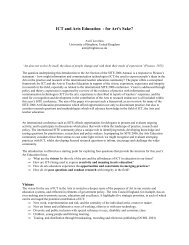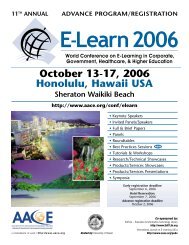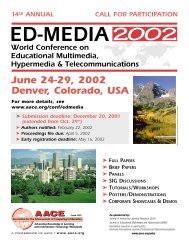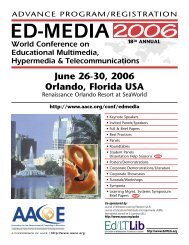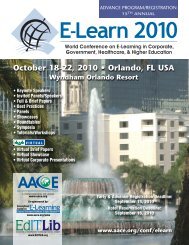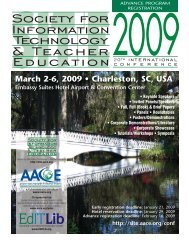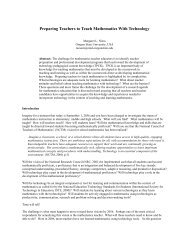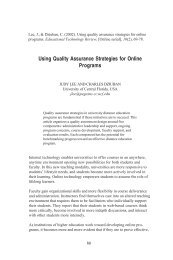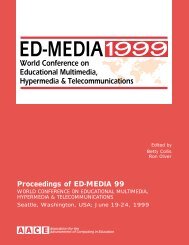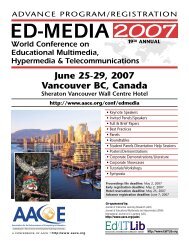ED-MEDIA 1999 Proceedings Book - Association for the ...
ED-MEDIA 1999 Proceedings Book - Association for the ...
ED-MEDIA 1999 Proceedings Book - Association for the ...
Create successful ePaper yourself
Turn your PDF publications into a flip-book with our unique Google optimized e-Paper software.
Technology and<br />
institutional<br />
Task Support<br />
GSS<br />
External facilitator & email<br />
leaders<br />
Access to repository of std templates, group<br />
data, links with o<strong>the</strong>r applications e.g. Word or<br />
Excel. Specialised views and Database<br />
hierarchies. Database or email advice to groups<br />
and individuals<br />
Table 1 Domains and Mechanisms <strong>for</strong> GSS facilitation<br />
While <strong>the</strong> table shows some meaningful in<strong>for</strong>mation, it does not provide a clear framework <strong>for</strong> understanding <strong>the</strong> facilitator role. For instance, <strong>the</strong><br />
domain of individual’s actions, while implicit in each of <strong>the</strong> rows, is omitted, as is <strong>the</strong> area of relationships and specific support activities.<br />
Temporal Analysis of Mediating Activities and Relationships with GSS Facilitation<br />
In this next analysis a time dimension is included, and <strong>the</strong> four mediation activities of Orlikowski et al. (1995) are used to structure <strong>the</strong> comparison.<br />
Illustrative examples are again drawn from <strong>the</strong> collaborative trial. (Clear, <strong>1999</strong>)<br />
Mediating<br />
Activity<br />
Meeting Phase Design<br />
Contingency<br />
Facilitator Actions<br />
Establishment Pre-Meeting Process Support Set up physical<br />
parameters and features<br />
of <strong>the</strong> technology<br />
Pre-Meeting & Process<br />
Modify institutional<br />
Meeting -<br />
Structure properties of <strong>the</strong><br />
introductory (global)<br />
organization to facilitate<br />
technology assimilation<br />
Pre-Meeting &<br />
Meeting -<br />
introductory<br />
Rein<strong>for</strong>cement Meeting -<br />
exploration and<br />
development<br />
Meeting - closure<br />
Adjustment Meeting -<br />
exploration and<br />
development<br />
Meeting - closure<br />
Post meeting<br />
Meeting -<br />
exploration and<br />
development<br />
Meeting - closure<br />
Post meeting<br />
Episodic<br />
Change<br />
Process Support<br />
Process<br />
Structure<br />
Process Support<br />
Process<br />
Structure<br />
(internal)<br />
Task Support<br />
Task Structure<br />
Articulate <strong>the</strong> cognitive<br />
and behavioral routines<br />
through which <strong>the</strong><br />
technology may be<br />
appropriated by users<br />
maintain <strong>the</strong> operational<br />
fidelity of <strong>the</strong> technology<br />
help users adopt and use<br />
appropriate cognitive and<br />
behavioral routines to use<br />
<strong>the</strong> technology<br />
Adjust technical features<br />
of <strong>the</strong> technology to<br />
promote use<br />
Alter usage rules and<br />
procedures to facilitate<br />
<strong>the</strong> use of <strong>the</strong> technology<br />
Post meeting Process Support Redesign <strong>the</strong> technical<br />
functions and features of<br />
<strong>the</strong> technology<br />
Post meeting<br />
Post meeting<br />
Process<br />
Structure<br />
Process<br />
Structure<br />
Modify institutional<br />
properties of <strong>the</strong><br />
organization to facilitate<br />
change in technology use<br />
Redefine cognitive and<br />
behavioral routines to<br />
facilitate change in users<br />
appropriation of <strong>the</strong><br />
technology<br />
Example<br />
Confirm resources (system capacity, technical support etc.)<br />
Organise creation of collaboration database and registration<br />
database <strong>for</strong> participants<br />
Establish collaboration parameters (scope, purpose, content,<br />
participants & timing with partnering institution’s facilitator)<br />
Confirm suitability of task<br />
Determine assessment regime<br />
Communicate intentions and obtain participants’ consent<br />
Ensure a match is made between <strong>the</strong> problem task, and <strong>the</strong><br />
participants & facilitator’s skill levels<br />
Determine and communicate group numbers and membership<br />
Provide a clearly defined task or set of objectives and<br />
corresponding agenda<br />
Create and communicate an overview of <strong>the</strong> issue/problem (via<br />
facilitator at each site and posting instructions in database<br />
Advise process to register users<br />
Clarify roles and expectations<br />
Advise of help or o<strong>the</strong>r tutoring features available, such as guides,<br />
sample templates, naming standards etc.<br />
Check registration process, monitor entries, resolve access<br />
problems (<strong>for</strong>gotten passwords etc.).<br />
Check <strong>for</strong> activity level of participants, and resolve bugs,<br />
problems<br />
The GSS itself as facilitator (shaping of o<strong>the</strong>r user’s activities of<br />
use) - enabling participants to contribute freely<br />
Providing <strong>the</strong> participants with some <strong>for</strong>m of control<br />
Facilitator promotes use of <strong>the</strong> GSS system<br />
Facilitator communicates and educates re. use of GSS<br />
If facilitator is a developer, may fine tune views, <strong>for</strong>ms etc. to<br />
enhance usability<br />
Facilitator may advise technical support staff of problems needing<br />
attention (e.g. “out of file space” errors etc.)<br />
Facilitator may decide to deviate from plan of action and use<br />
different facilities of <strong>the</strong> GSS to support <strong>the</strong> meeting activity (e.g.<br />
attached files vs. document section entries)<br />
May advise new naming or o<strong>the</strong>r standards to enhance use<br />
May create new features e.g. on-line questionnaire <strong>for</strong> evaluations<br />
Facilitator as researcher may decide to recommend changes to<br />
clumsy or ineffective aspects of technology (e.g. upgrade views,<br />
redesign hierarchies that are too deep, improve navigation etc.<br />
Facilitator may recommend extensions or enhancements to GSS<br />
e.g. automatic links between registration and collaboration<br />
Databases to share email addresses within and between groups, or<br />
use of agents to link mail features more tightly with <strong>the</strong> GSS<br />
Determine a general ethical approval process <strong>for</strong> collaborations<br />
Set policy regarding summative vs. <strong>for</strong>mative assessment in trials<br />
Streamline <strong>the</strong> process of establishing fur<strong>the</strong>r collaborations, or<br />
extending <strong>the</strong> model to o<strong>the</strong>r courses<br />
Facilitator may decide to use different features of <strong>the</strong> technology<br />
<strong>for</strong> next collaboration (e.g. a ranking feature may be used to judge<br />
<strong>the</strong> merits of <strong>the</strong> design proposals submitted)<br />
Table 2 Temporal Analysis of Mediating Activities and Relationships with GSS Facilitation



